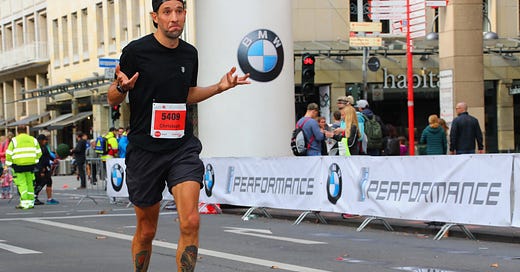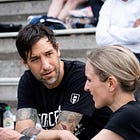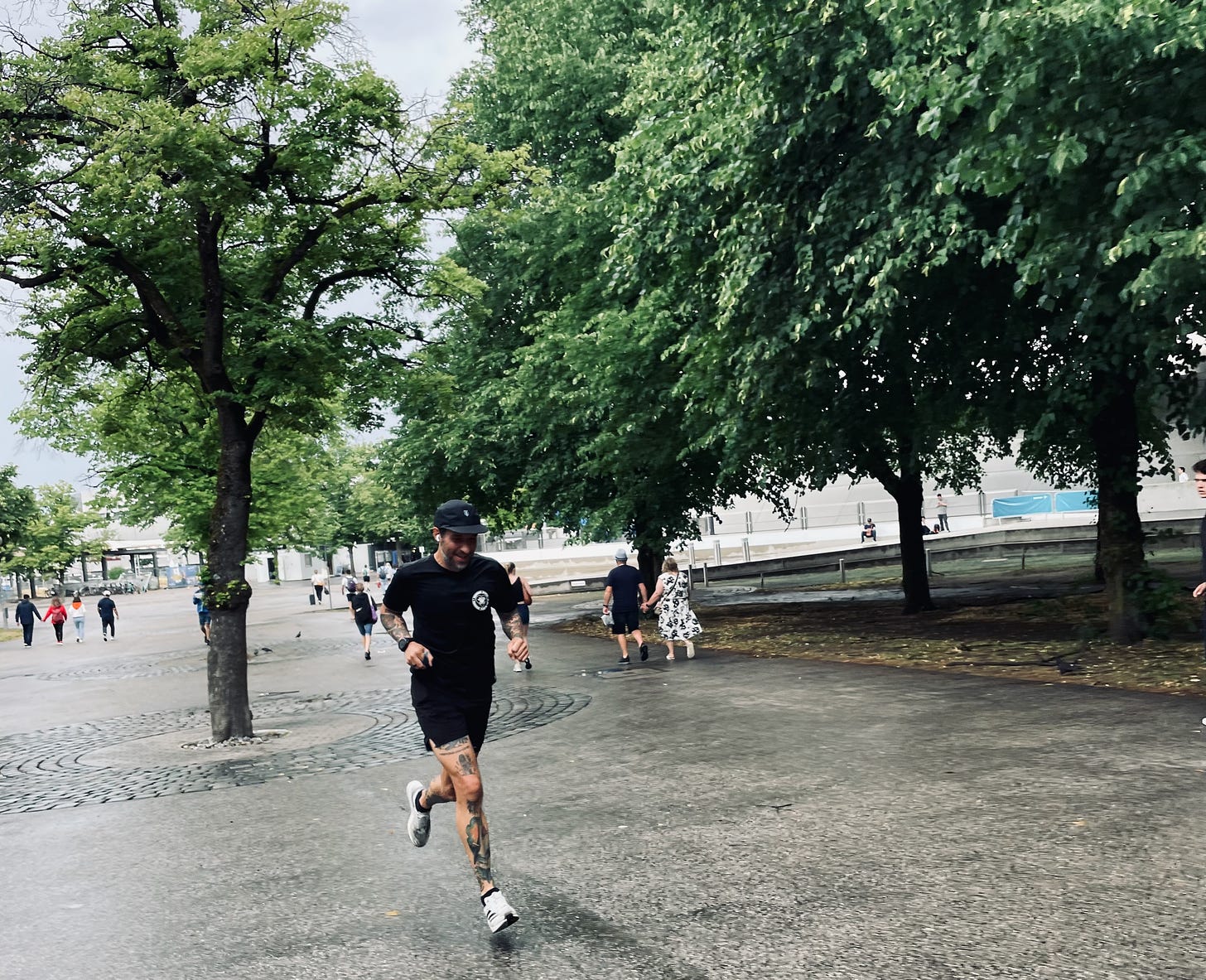Do you remember the Das Z Letter where I wrote that I wanted to revisit the subject of "tapering"? No? No big deal, I won't take it personally. Here’s a little help. I wrote the following at the time:
I couple of weeks ago, I mentioned that my race results most often do not match my training results. That was also the case in Valencia. It's been like this for years, and I never really found out why. I’ve made peace with this phenomenon a long time ago, but now my coach and I have a fresh new idea: Tapering.
We had already played around with this critical phase before races a bit. We tried to make it steeper by reducing training volume and intensity over a shorter time span (that’s what we did for Valencia, for example), and also flatter. But at the core, it mostly remained a classic taper: Cutting volume (not intensity) by about 20–30% over a time span of 14 to 21 days. You know this, you’ve done it yourself.
While my body reacts positively to one or two easier days or even a full day off, it seems like it is “falling asleep”, if the tapering phase is going on for too long.
And this is the point where I leave you with a massive cliffhanger. I really want to dive more deeply into this topic and therefore need more time and self-experiments. I will share all my learnings with you in – another – separate Das Z Letter, soon.
That “soon” is today.
With two consecutive marathons within just 8 weeks, which couldn't have been more different, the case now seems clear to me. While I ran – well tapered – a 3:07 in Valencia, I was a whole 10 minutes faster in Rodgau after a full 100 km training week with zero tapering.
Sounds suspicious, doesn't it?
What's with the tapering?
For as long as I can remember, tapering before a race has always been a mystery to me. I never understood or felt what it was supposed to do, and I just did it because "that’s what you do it as a runner".
This Das Z Letter, almost a year old, shows how lost I am when it comes to tapering:
And this Das Z Letter shows how I went berserk in 2021 when I tapered for the CCC, my first 100k race. The Levelhead entered a wild panic mode of self-doubts, ridiculous rethinking and pointless worrying. Basically, questioning everything.
But the worst thing isn't that tapering is pure stress and super nerve-wracking. The worst thing is that it doesn't work for me. The exact opposite seems to be the case. Instead of recovering bit by bit and watching my energy curve rise steeply until race day, my body seems to fall asleep and then mercilessly underperform on race day.
Train like a pro, race like a rookie
On race day, from the first kilometer, my heart rate at any given pace is almost always 15–20 beats higher than in training. In other words, when I run at marathon effort, I am 10–15 seconds slower per kilometer than comparable key training sessions would suggest. On the contrary, test races run out of training, with no rest days or tapering, usually go really well.
Sounds suspicious, doesn't it?
I know what you're thinking now:
"There's a very simple explanation for this..."
Don't bother. I've already heard all the ideas and suggestions.
No, it’s not the race day excitement that makes my heart beat faster, and my legs feel heavy. I’m equally (un-)excited at any given start line, no matter if it’s an A, B, or C-race. I have heard this “good guess” hundreds of times from dozens of people and can clearly rule it out.
The same goes for the theory of accumulated fatigue due to a training cycle that was too demanding. I've done both, trained so hard that my legs fell off, and trained so lightly that I wouldn't even call it training. And everything in between. This approach is also a dead end.
The heat. Yes, that is indeed an influencing factor for me. I am extremely sensitive to heat. Anything above 15 degrees Celsius negatively impacts my performance. Above 20 degrees, the decline in performance is so pronounced that I don't really need to start anymore. But I've had enough races where it wasn't hot, and I still underperformed dramatically.
Everything else, like race week nutrition, sleep quality and stress avoidance, is under control. The Levelhead does his job well.
As I said before, I have made peace with this “Training: great! Race: ok.”-problem a long time ago and accepted that this is the way I work. But maybe I gave up too easily. Since Rodgau at the latest, I know that taking a closer look at my tapering is definitely a hot lead.
What the coach says
“I’m starting to understand how your body reacts.”
Since Rodgau, we've been toying with the idea of skipping tapering altogether for my next A-race. We also started playing around with training loads and rest days. Or rather, no rest days. And no recovery weeks.
In this training cycle, my body is in a constant state of alertness, and I don't lack for rest. I seem to recover well on days with slower endurance runs. I can even cope with back-to-back tempo sessions and when my 100+km week is over, I can hardly wait for the next one to start.
Furthermore, I'm also not injured. Not even close. Any stiffness or shortening that occurs is easily managed with my rolling and stretching routine.
And the training results are truly impressive. I can run even the toughest sessions in a relaxed and controlled manner with a heart rate as low as if I were sitting on the couch. I have even regained some of my Garmin Vo2 Max points that I lost with Covid 2 years ago and never got back.
Apparently, we're doing something right.
The Test Run
As I write these words, I am on a writecation in Linz, Austria. The reason I chose Linz for my writing holiday is not only its enchanting charm, but also a half-marathon in Wels, that I will be running on Sunday. Straight out of a massive 4-week training block and without a taper. If that's not an exciting self-experiment, I don't know what is.
Of course, I will tell you how it went.
EDIT: Here’s how it went: https://dasz.substack.com/i/141549073/everything-running
Everything not Running
I recently came across
on Substack. He is the author of "The $100 Startup" (and many other great books), which was a giant influence on me when I started my running brand, Willpower. There were probably dozens of other books that would have helped me just as much, but “The $100 Startup” was in the right place at the right time.The following key messages from the book resonated with me the most:
1) When founding a startup, it's important to listen to your heart. But not only that. The business idea should be at the intersection of your passion, interests, skill set and something that people really need and want to buy. Chris Guillebeau calls this convergence.
2) A business plan fits on one A4 page. Too much planning is the death of any startup.
3) Get online as soon as possible. This is the only way to find out if your business idea works or not.
4) So-called "micro-businesses" and "side hustles" have many advantages. They are small, easy to manage, and can be built around your own strengths and time schedules.
5) To survive as a business in the long term, you must be prepared to constantly review and change your products and services. Adaptability is essential.
Interestingly, the main theme suggested by the title of the book is not explored in any depth: Bootstrapping. In other words, starting and running a business without external funding. You put only the money you have already earned into your own business.
This was and still is a cornerstone of Willpower. To this day, not a single euro of outside capital has flowed into the company, and I have always worked with what I had available. I had to be very creative, especially in the first few months, but once things were up and running, it was a good feeling not to owe anyone anything. Literally and figuratively.










@all: There's a couple more things I could not fit in the article because it would have been too crammed. Overall training load over the whole training cycle seems to play a role. Also so-called "ignition workouts" (I came up with the name). That's usually speed work with longer intervals at threshold intensity. Something about these workouts seems to "wake up" something inside of me. My coach and I are playing around with those and contradict all the usual rules of training theory along the way haha!
Your tapering article is making me think more deeply about my training plan. I want to run my first marathon next Saturday. Until your article, I was of the opinion that 16k with 10k race pace beforehand was too close to be totally fresh at the start line and wanted to replace the session with a few cruise intervals. After reading your article, I now think that the COROS coaches who created my adaptive plan may have had something in mind and are not big tapering fans either. The pondering continues…
I'm glad that you said in the Sprachnachricht where your A-race is - which is practically on my doorstep. So I'll come and cheer you on in my Willpower shirt. If you want any tips on the location of the hotel or anything else about my home town, let me know.